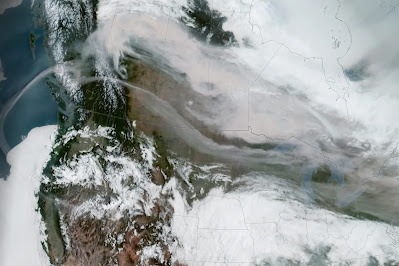 |
| Satellite view Saturday of dense smoke from fires in Alberta pouring across the International Border into Montana and surrounding states |
Calgary, Alberta, Canada is also known as a clean air city. It's on the high plains just east of the Canadian Rockies, not far from Banff National Park.
In recent years, though, those cities have had relatively brief but disconcerting episodes in which they had the worst air pollution in the world. Worse than Beijing. Worse than New Delhi. Worse than than Lahore.
The problem is wildfires. Thanks in large part to climate change, these cities have had episodes of intense, dangerous air pollution.
The latest victim is Calgary. The smoke from Alberta wildfires is spreading far and wide But Calgary, a major city closest to the fires, is really socked in by the smoke.
Smoke this past week in the Canadian city was downright dangerous, even for healthy people. The smoke was double the level considered hazardous, and visibility was done to a half mile. Calgary was probably the most polluted city in the world on Tuesday.
This is reminiscent of San Francisco in 2021, when wildfires turned the sky and air an apocalyptic orange, and created serious health alerts.
For a time last October, Seattle had the worst air quality in the world due to wildfire smoke. Some wild fire smoke has returned to Seattle from Canada in recent days, but it's so far not as bad as last year.
Back in Canada, the wildfire smoke problem has been getting much worse in and around Calgary. They rarely had problems with smoke before about 2015, but since then, it's been a yearly issue.
The smoke isn't just annoying and disheartening. It's dangerous. The smoke can endanger people with lung and heart problems, and worsen asthma.
The American Lung Association says wildfire smoke contains tiny particles that can embed themselves deep in the lungs, which is why it's so dangerous. The smoke can trigger heart attacks and strokes in susceptible people. So it's nothing to be trifled with.
 |
| Wildfire smoke from Alberta, Canada blotting out the sun over Vermont on May 8 |
The worst spring wildfire season in Alberta continues to grind on in the face of record early season heat. Smoke from these fires have spread far and wide. Record high temperatures continued across western Canada this week, encouraging fires to spread and new ones to start.
Even up in the Northwest Territories of Canada, where snow should still be on the ground, wildfires are burning amid the record heat.
At least 90 fires were burning across Alberta as of this week, so the smoke isn't going to stop anytime soon.
Air quality alerts were in effect yesterday and continue today in Montana, Washington State, Minnesota and other states as the smoke was at ground level there.
The smoke is even more widespread aloft, streaming over much of the United States. I once again noticed smoke high overhead in Vermont this morning. That's at least the eighth day this month in which smoke dimmed the sun over the Green Mountain State.
So far, anyway, the smoke over Vermont hasn't really made it to the surface, although a bit haze in the air this morning and on some other days in the past couple of weeks indicates a few of those particulates in the wildfire smoke is making it into our lungs.
Still, air quality in Vermont hasn't been too bad. The air quality index in Vermont was still in the "good" range this morning, so no issues there.






0 Comments